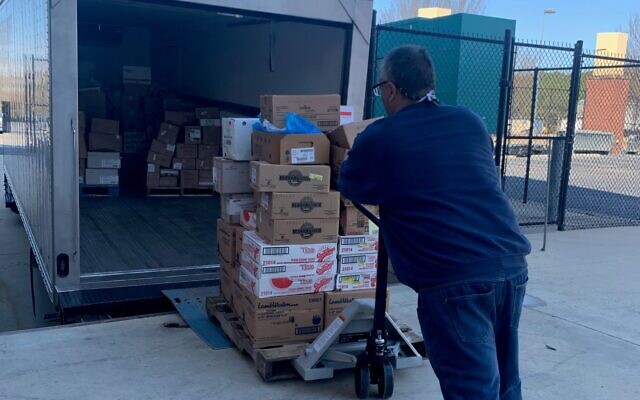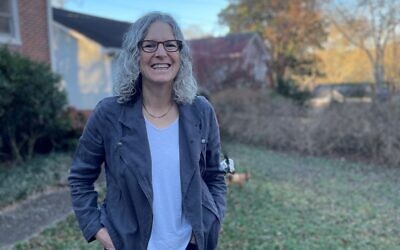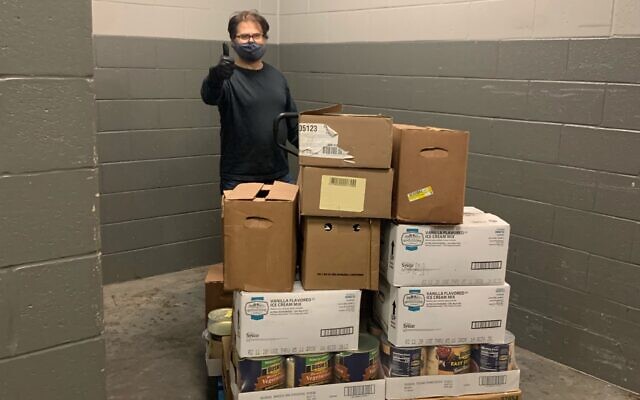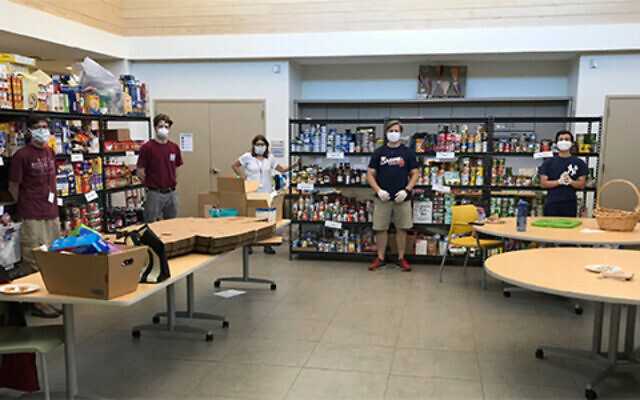Addressing Hunger in a Pandemic
As pandemic worsens food insecurity in Georgia, the Jewish community is using its resources to help its own and the wider community.
A rising sophomore at Georgetown University, Nathan plans to major in government and minor in film and media studies as well as statistics, hoping to eventually get into a career creating digital content for campaigns or covering them for the Atlanta Jewish Times and other media outlets.

On Sunday, March 7, many Georgians participated in the Hunger Walk/Run, albeit virtually by walking and running throughout the state. The walk, typically held in person, helps to raise funds for the Atlanta Community Food Bank. Started in 1984, the event has gained extra significance during COVID-19.
Since the pandemic began last year, Atlanta has seen the issue of food insecurity grow dramatically, including in the Jewish community. The combination of the pandemic’s financial crisis and schools moving online, leaving many children without their usual food source, has created a greater need.
The Hunger Walk helps to fund community-based efforts to combat food insecurity within Jewish Atlanta and beyond.

At Jewish Family & Career Services’ Kosher Food Pantry, the pandemic has caused a major increase in demand, the pantry’s new manager Jennifer Weissman told the AJT. “There is so much need because of COVID. People have lost their jobs, experienced illness, and people with small children may not be receiving school meals if their children are at home.”
Under the initial management of Jean Millkey, the pantry’s demand grew from 17,500 pounds of food distributed between July 2018 and June 2019 to over 161,000 pounds of food distributed between July 2020 and now. Over those same periods, the pantry expanded from serving 1,900 people to over 9,700.
The service is not only helping to alleviate the issue of food insecurity, but helping promote self-sustainability, Weissman said. “If we can provide people food, we are also enabling them to pay for other things: medication they need, their phone bills or utilities, … and have success in other areas of their lives.”

The pandemic has also caused JF&CS to increase the size of its pantry, said Faye Dresner, JF&CS chief impact officer. “Pre-COVID, our food pantry was a small office, serving primarily our own internal clients.” It moved Sunday to large trailers outside the agency’s Dunwoody office.
JF&CS also is making it easier for people to access the pantry. “Starting this week, we are opening up our hours for drop-in services,” Dresner said. “People in the past had to make an appointment or get a referral to come to the pantry, and we are changing that and now saying anyone can come Monday, Wednesday, Friday 11 to 2.”
Weissman, hired in the past month, is a registered dietician with a background in public health. She told the AJT, “We really wanted to get rid of the barrier for our clients.”
While the pantry is run by JF&CS and offers kosher food, it helps to serve the wider Atlanta community too with only 20 percent of the food pantry clients identifying as Jewish. For a populaton of only about 2.5 percent of the total community, the fact that 20 percent of JF&CS’s clients are from the Jewish community indicates there is a significant food insecurity among Jewish people in Atlanta, Dresner said.

In particular, Jewish seniors over 60 have been hit hard by the pandemic. They make up about 80 percent of Jews accessing the pantry, she added.
“Our biggest challenge is getting the word out beyond the affiliated Jewish community to make sure that Jewish people all over the metro area know this resource is here for them whenever they need it,” Dresner said.
JF&CS is also helping those in need with direct financial assistance through its Emergency Assistance Program, “with the goal of helping people achieve self-sufficiency.”
JF&CS also partners with other programs in the Atlanta area to address the Jewish community’s food insecurity, including Open Hand Atlanta, the Atlanta Community Food Bank and Second Helpings.
Laura Samnadda, director of nutrition services at Open Hand Atlanta, told the AJT about the organization’s current involvement with Jewish Atlanta. “We serve clients in many of the senior living communities through our senior contracts: The Zaban Tower, The Jewish Tower and The William Breman Jewish Home, among others.” In addition to supporting the community, Open Hand receives support from it with regular funding from the Atlanta Jewish Foundation, she said.
Open Hand has seen a “huge increase in the amounts of clients we serve through our home delivery meals throughout the pandemic,” she said.

Second Helpings, another Atlanta-based organization targeting food insecurity, redirects food otherwise discarded, increasing its efforts during the pandemic. “We have pivoted during the pandemic to also pick up prepared meals and meal kits through partnerships with companies like HelloFresh and acclaimed chefs,” according to executive director Andrea Jaron.
The Atlanta Community Food Bank also directly helps the Atlanta Jewish community, said Heather Moon, public relations manager.
“In addition to Hunger Walk/Run, the Jewish community is involved with the Food Bank in a few ways. We provide educational support with Hunger Seder via our education team. We also partner with our Jewish community through Operation Isaiah, an annual metro-wide food drive. The Hunger Walk itself is no small event, with 60 percent of funds being raised by Jewish teams going to the Jewish Federation of Greater Atlanta, which manages those funds for distribution.
Harper Landau, the Birthright Israel Fellow at the Federation, is helping manage those funds and the partnership with the Hunger Walk. The Federation is one of five faith-based organizations partnered with the Hunger Walk, serving a key role. “We are a fundraising umbrella for all of the organizations and teams that fall under the Jewish umbrella,” Landau said.
Even though the race was canceled in 2020, it raised about $81,000 to allocate to the community, she said. There are a variety of programs and organizations the funds support, from the Kosher Food Pantry to a number of backpack buddy programs in which synagogues pair with schools to give children backpacks full of food. The latter target students that rely heavily on the schools’ meal programs so they are can receive food over the weekend when they aren’t able to access that food source. In response to the pandemic, Landau said, “We saw almost every organization had an increased need and a major increase in the people they were feeding on a daily or monthly basis.”

According to its website, the Atlanta Community Food Bank has seen a 300 percent increase in inquiries from people seeking food assistance.
Dresner at JF&CS told the AJT, “16 percent of the population in Atlanta is food insecure, that’s up 47 percent from 2018. … Before the pandemic 16 percent of kids were food insecure, and now it is estimated one in four kids.”
The funds from the Hunger Walk will help address food insecurity but will only put a dent in the issue heightened by the pandemic. While students are likely to return to schools this fall where they will again receive food, and there’s a possibility of an economic recovery helping people afford food again, food insecurity is likely to continue to be an issue, according to those interviewed for this story. The infrastructure and programs being funded now, however, will continue to address the problem.
- Nathan Posner
- News
- Community
- pandemic
- COVID-19
- Food Insecurity
- Hunger Walk
- Jean Millkey
- JF&CS
- Emergency Assistance Program
- Laura Samnadda
- Open Hand Atlanta
- Atlanta Community Food Bank
- Second Helpings
- Operation Isaiah
- Food drive
- Birthright Israel
- jewish federation of greater atlanta
- Kosher Food Pantry



comments